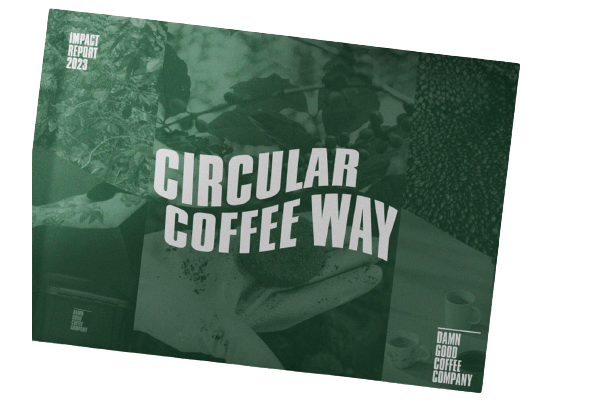
Customer story
Advancing Sustainability in the Coffee Industry: A Three-Year Partnership with Damn Good Coffee Company
Since 2021, SuFu and Damn Good Coffee Company have joined forces, relentlessly pursuing sustainability in the coffee industry.
DGCC, on a mission to revolutionize coffee into a sustainable and circular commodity, is reshaping one of the world’s most traded goods. They import, roast, and supply high-quality coffee to businesses dedicated to sustainability and emissions reduction, guided by the 4R principle: Regenerate, Reduce, Reuse, Recycle.
Our analysis leaves no aspect of the coffee life cycle unexamined. From agricultural emissions to innovative coffee ground repurposing, and from intricate transport logistics to sustainable packaging and delivery, we've adopted a holistic "cradle-to-grave analysis." This ensures thorough scrutiny of greenhouse gas emissions across all phases: farming, export, roasting, packaging, distribution, and coffee grounds.
Unveiling farming emissions posed the most complex challenge. DGCC required a model to proactively assess supplier emissions via a structured questionnaire. Originally designed for supplier sustainability assessment, the Coffee Supplier Emission Toolkit has evolved into a comprehensive resource. To ensure precision, we developed a calculator based on an exhaustive review of 50 scientific papers and data from 30 journal articles. This Toolkit, comprising a Survey and Calculator, empowers us to estimate GHG emissions from coffee farming, even with limited data.
Our literature review aimed to understand green coffee production phases, collect GHG emissions data at various stages and identify key factors and emission categories. We harmonized data to 1 kg of green coffee, calculated emissions using available data, and estimated missing values regionally. Milling emissions were sourced from literature. The model provides reference scenarios for emission comparisons.
Over the years, we collaborated on projects to measure and reduce DGCC emissions from export, packaging, distribution, and coffee grounds management. This collaboration led to multiple climate action strategies implemented by DGCC. Farming emissions saw a significant 77% reduction, driven by organic agroforestry and the elimination of synthetic fertilizers.
Packaging and distribution achieved an 84% reduction, thanks to eco-friendly reusable packaging and cargo bikes/electric vans. A 76% CO2e reduction was achieved by diverting coffee grounds from landfills for green energy and upcycling. The remaining emissions are removed through high-quality carbon removal projects. Notably, DGCC published its first Impact Report in 2023.
Our journey continues with opportunities for emissions reduction in transportation, roasting, heating, electricity usage, and residual farming emissions. As we move forward, our commitment to a sustainable coffee industry remains unwavering, promising even more significant environmental impact.
In conclusion, our three-year partnership with DGCC underscores the power of collaboration in driving coffee sustainability. Transparency, accountability, and innovation have yielded tangible results. This case study demonstrates what shared dedication to environmental responsibility can achieve.
“SuFu’s expertise in quantifying and reducing carbon emissions has been instrumental in our journey towards sustainability. Their dedication to transparency and accountability has helped us achieve remarkable reductions in emissions across our entire supply chain. We are extremely happy about our ongoing partnership.”
Contact us today to learn more and discuss your specific consulting needs.
Check out our services:




